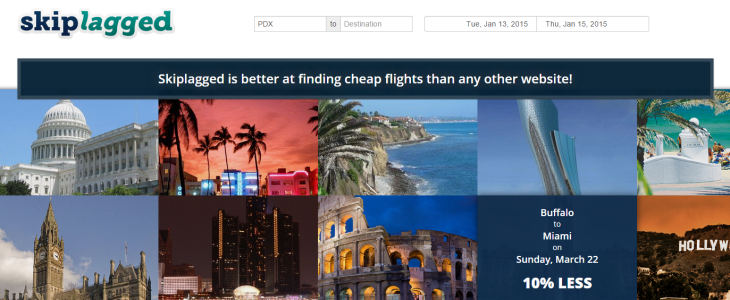United Airlines and Orbitz are suing Skiplagged, a small startup founded by Aktarer Zaman that helps travelers hack the airlines’ opaque pricing schemes to get better deals by finding so-called “hidden city” fares.
Airline pricing is incredibly complex and one of its many oddities is that when you are looking for a good price, it’s often cheaper to buy a ticket from, say, San Francisco to Houston that goes on to New York (even though you just want to go to Houston) than a regular one-way ticket. In the airline industry, those are called “hidden ticket” fares (and they only work when you don’t check any luggage).
While booking flights with the clear intent to not fly to the final destination on your ticket is clearly against the airlines’ rules, frequent fliers have long used this trick to get better fares. They, however, are also aware of the potential consequences. United specifically prohibits fliers from using the hidden cities trick, and its Contract of Carriage clearly states the potential consequences (though I’m not sure any of these have ever been tested in court). They could charge you for the regular fare, delete miles from your frequent-flier account, kick you out of their Elite flier program or take legal action, for example.

United and Orbitz allege that Zaman used Skiplagged to “intentionally and maliciously interfere with [their] contracts and business relations in the airline industry […]” and “by promoting prohibited forms of travel on Skiplagged, Zaman has induced breach of Orbitz Worldwide’s travel agency contracts with commercial airlines and of United’s customer contractual relationships.”
United says it prohibits “hidden city” ticketing because of “logistical and public safety concerns” — though the worst thing that could happen is that the airline would have to make an announcement at the gate asking you to please board quickly and then, when you don’t show, give your seat to a standby passenger (despite its claims, the days when United used to hold flights for late passengers are long over). You can read the full complaint here.
For the most part, using this trick was always something frequent fliers and travel agents were aware of, but not something the general public knew about. Skiplagged has the potential to make this practice relatively mainstream, however, and throw the airlines’ complex pricing schemes into disarray.
The easiest thing to do, then, is to sue Skiplagged. Even though there may be nothing illegal about what the company is doing, lawsuits like this can get expensive enough to destroy fledging startups like Skiplagged — and that’s probably what United and Orbitz are aiming for. In the complaint, United and Orbitz also note that Skiplagged probably wasn’t incorporated, so Zaman may be personally liable.
For now, however, the Streisand effect is in full swing and more people now know about these kinds of tricks than ever before.
